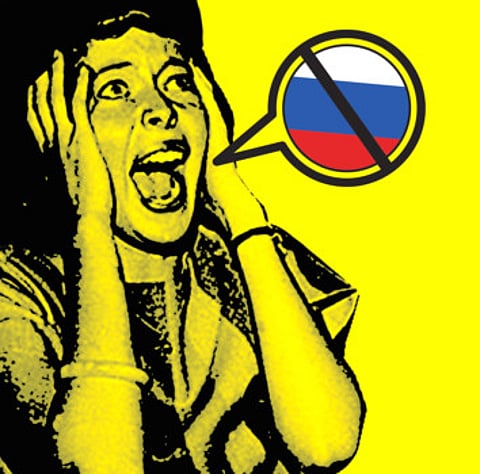Why rising hysteria against Russia is a threat to Europe
It is not in Europe’s interest to be at war with Russia

The people in Ukraine split into two parts: The ‘good’ guys — who made a peaceful Maidan revolution in a poignant democratic move. And the ‘bad’ guys — namely the Russians, who attempted to reconquer former soviet territories and threaten Eastern Europe in a new Cold War.
So is the situation as viewed by a large number of westerners, American Republicans being on the front line, especially Senator John McCain — whose ineptness in foreign policy has a long track record — and Under Secretary of State Victoria Nuland — nothing of a surprise since she belonged to Dick Cheney’s teams and also, is married to neo-con Robert Kagan.
For many years, the world has learnt to live with the consequences of American diplomacy’s silliest moves. It may happen to have good news — see the agreement with Iran, despite Benjamin Netanyahu and allies’ habits to bring everybody back to the tagged roads of anxiety. But in Ukraine, Europe itself is on the centre stage and irresponsible calls for crime coming from the other side of the Atlantic cannot be treated lightly.
The matter is not to know how the West reached there, but how it will get out of it.
Historically, there would be much to say about Ukraine’s independence, the former role of Kiev as a Russian capital, the justification of Ukraine, Belorussia and other Russian satellites as a mean to cast more votes at the United Nations. As for Crimea, which was ‘given’ to Ukraine by former soviet leader Nikita Krushchev, it never belonged to the latter, but to a local suzerain reporting to the former Ottoman Empire.
Additional comments could also be made on the “spontaneous Maidan revolution”, the role played by the CIA (unto the already known graphic chart of the banners) and the complete disrespect of commitments taken by the Kiev politicians towards European states.
If one adds the following, everything is met to enter an endless conflict with Russia: Silly banning of Russian language in the Russian-speaking Eastern Province of Donbas; blind bombing by Kiev authorities of infrastructure and civilian populations and dramatic blockade of Lugansk and Donetsk territories (no gas, no electricity, no food transportation, no health services ...); Malaysian Air crash; and, the icing on the cake: Request by Kiev authorities to receive arms, join the European Union (EU) and adhere to Nato.
Yet, it is not of Europe’s interest to be at war with Russia. Despite irresponsible and aggressive language by some western politicians who have contributed to radicalise the situation, Russia and Europe have much better to do together, even though it should be at the expense of some American interest.
Today, the situation is deadlocked. Anglo-Saxon hysteria against Russia and its President Vladimir Putin has reached such levels that one wonders for how long European leaders like German Chancellor Angela Merkel and French President Francois Hollande will be able to stand firm. Whatever happens, indeed, is always of Russia or its president’s responsibility. See the strange and still unresolved murder of Russian politician Boris Nemtsov on February 27: Even though there is no proof of the murder, Putin is said to have “created the atmosphere of nationalist paranoia that made (Nemtsov’s) assassination permissible”. Here we are and bad souvenirs come up to mind: Saddam Hussain may not have had any of those weapons of mass destruction, but the nature of his regime had created the conditions for a US military intervention.
Such reasoning is pathetic and one should come back and stick to diplomacy. Another agreement was signed in Minsk on February 12 this year by all parties involved and then joined by Russia, Germany, France and the Organisation for Security and Cooperation in Europe. Time is thus not for Ukrainian President Petro Poroshenko to go on playing dilatory moves in adding non pre-agreed items. It is not also for US warmongers to reverse a European reality with the old receipts of the Cold War: Ukraine is not part of Europe and will never be. And it cannot be a part of Nato either, unless one thinks there is nothing more urgent than fighting Putin.
Let us stop a foolish move that puts at stake security in Europe and start from where the problem stems — Ukraine. Yes, there is a sovereign issue in Ukraine; yes, there is need for some kind of an autonomy in the Eastern province, whose population speaks, feels and behaves like Russians.
Let us sit around the table with no afterthought and let us acknowledge the ground realities, the willingness to enhance a future fruitful cooperation between the West and Russia, based on mutual respect and balanced interests.
And let the West prevent the howling hyenas from making a travesty of the word ‘democracy’, as they have done in Iraq, Libya and elsewhere.
— Project Syndicate, 2015
Luc Debieuvre is a French essayist and a lecturer at Iris (Institut de Relations Internationales et Strategiques) and the Faco Law University of Paris.
Sign up for the Daily Briefing
Get the latest news and updates straight to your inbox



